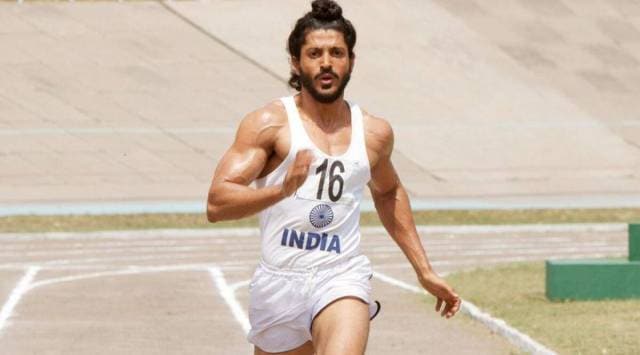Click here to follow Screen Digital on YouTube and stay updated with the latest from the world of cinema.
Rakeysh Omprakash Mehra deconstructs Bhaag Milkha Bhaag’s climax, how Milkha Singh had tears in eyes while recounting story
Bhaag Milkha Bhaag director Rakeysh Omprakash Mehra deconstructs the climax of the film where he took creative liberty to find the crux of his film.
 Farhan Akhtar in a still from Bhaag Milkha Bhaag.
Farhan Akhtar in a still from Bhaag Milkha Bhaag. One of the most emotional sports biopic, Bhaag Milkha Bhaag, starring Farhan Akhtar, completed ten years last month. On the film’s tenth anniversary, the makers decided to re-release the film in theatres. This time, it was even more inclusive as it also has the sign language version attached to it on the big screen.
Rakeysh Omprakash Mehra, in this interview with indianexpress.com, talks about how he found his sports drama after living with Milkha Singh for a week, and why he took creative liberty in the film’s climax scene as he discusses the film at length.
About re-releasing the Farhan Akhtar starrer, Mehra shares that this is their way to pay homage to Milkha Singh who died from Covid-19 complications in June 2021. Mehra says, “It’s been ten years since the film was released. I have really cherished every moment while making the film. We got a lot of love for the film and it has inspired people across the spectrum across the world in so many different ways. We lost Milkha Singh two years ago and the special screening was to pay homage to him with his family. The cast and crew of the film came together, it was like a reunion. Then we decided to re-release the film in 30 cities in India.”
Mehra adds that this time over the film has been adapted for speech and hearing impaired. He shares, “This time over, the film has been adapted with the Indian sign language. The endeavour was to take it to take it to a different group of people and I would love to do that with all my films. We as a society, not just filmmakers need to be more inclusive and this is just a very very small gesture, baby steps in that direction.”
Mehra then deconstructs the film’s climax scene, which formed the crux of his film. He also explains why he took creative liberty to show Milkha Singh’s “technical glitch” during the Rome 1960 Olympics due to which he lost on the gold medal.
He shares, “I chanced upon Milkha Singh’s biography but it was in Gurumukhi, which I can’t read. I asked an uncle of mine, who knew the script, and he told me the story in bits and pieces, which intrigued me a lot. I arranged a meeting with Milkha Singh in Chandigarh. I clearly remember I went by the morning flight and I had an evening flight back. Meeting him felt like coming home, he hosted me with a lovely spread and a good meal. I had so much fun talking to him, I cancelled my ticket and stayed back in Chandigarh for the next seven days. I didn’t even have a change of clothes, so I went to Khadi Bhandaar to pick a few kurtas and pyjamas for myself and checked into a hotel.”
Mehra further remembers how he found his film’s focal point in Milkha Singh’s narration of his story. “When he was telling me his story, I saw tears in his eyes. He spoke about the massacre of his family… he was a 12-year-old child who witnessed the ethnic violence during the Partition. The second time he had tears in his eyes was when he spoke about the Rome Olympics final when he looked back and it was a technical error and in that moment another runner forged ahead. I went back to the hotel and I thought that is my film,” he shares.
“And then I wrote the climax of the film when he was in Lahore, Pakistan, and he ran the race with all his heart and won the race obviously, against the Asian champion Abdul Khaliq. When he is taking the victory lap, he sees himself as a child running besides him and smiling at him. He had overcome all the bad memories and hatred and darkness he held for all these years. So that was my film, once I had these two scenes in place, I went out to write everything for which the material was always there and there was so much to draw from his life,” he adds.
Bhaag Milkha Bhaag is one of Mehra’s most celebrated films, along with Aamir Khan’s Rang De Basanti that released in 2006. On being asked if he thinks he’d re-release Rang De Basanti in the present political scenario, Mehra says that he’d love to do it when the film celebrates its 25th anniversary.
“I would love to if there is an ocassion like that, like how we have ten years of Bhaag Milkha Bhaag. I would love to (do it) when we reach a milestone year with Rang De Basanti. I would love to bring it back on the big screen though it is available on (streaming) platforms for people to watch. The film was released in 2006 so it is almost 17 years, maybe we should try that when we celebrate the 20 years of Rang De Basanti a couple of years from now,” Mehra concludes.



- 01
- 02
- 03
- 04
- 05































